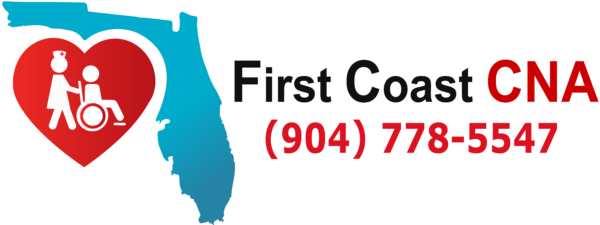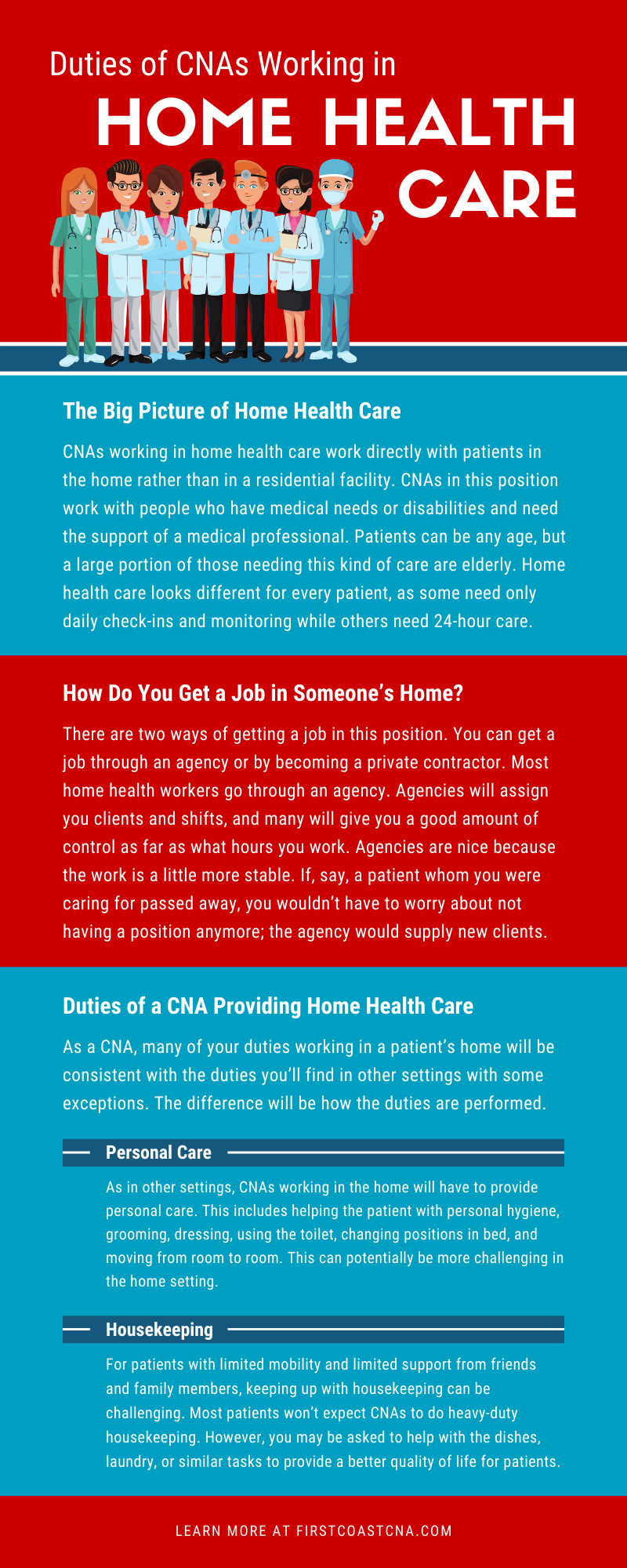In our blog, we love discussing the versatility of being a certified nursing assistant. We’ve talked about working with patients in a hospital or nursing home setting, but there are additional ways to work as a CNA. One option is to work with patients directly in their homes. Home health care is a truly unique position within the medical field. It is intensely personal, allowing patients the greatest amount of freedom and you, as a worker, a deeper connection with your patients. To paint a clearer picture, here are some of the privileges and the duties of CNAs working in home health care.
The Big Picture of Home Health Care
As we said, CNAs working in home health care work directly with patients in the home rather than in a residential facility. CNAs in this position work with people who have medical needs or disabilities and need the support of a medical professional. Patients can be any age, but a large portion of those needing this kind of care are elderly.
Home health care looks different for every patient, as some need only daily check-ins and monitoring while others need 24-hour care. So the duties of a CNA in this position may look a little different, depending on the patient. Most CNAs have a 40-hour workweek with consistent hours, others may work part-time, while others may live in the home of their patients. Since many patients need 24-hour care, you can get hours at almost any time of day or night, weekends, or holidays if you choose.
How Do You Get a Job in Someone’s Home?
There are two ways of getting a job in this position. You can get a job through an agency or by becoming a private contractor. Most home health workers go through an agency. Agencies will assign you clients and shifts, and many will give you a good amount of control as far as what hours you work. Agencies are nice because the work is a little more stable. If, say, a patient whom you were caring for passed away, you wouldn’t have to worry about not having a position anymore; the agency would supply new clients.
You can also choose to work independently for a family. This has some perks—namely, the ability to set your own hours and pay; however, there are some caveats you will have to navigate if you go this route. As a private contractor, you have to look into IRS and local tax requirements, such as registering as an independent contractor and filing for taxes as a self-employed worker. You also do not have the extra support of an agency as far as asking for extra assistance with a client or having their protection if something goes wrong in the house.
Duties of a CNA Providing Home Health Care
As a CNA, many of your duties working in a patient’s home will be consistent with the duties you’ll find in other settings with some exceptions. The difference will be how the duties are performed.
Personal Care
As in other settings, CNAs working in the home will have to provide personal care. This includes helping the patient with personal hygiene, grooming, dressing, using the toilet, changing positions in bed, and moving from room to room. This can potentially be more challenging in the home setting. While many patients who are living with health concerns that hinder mobility have homes set up to accommodate their needs, others do not. Getting in and out of bathtubs or beds or getting off toilets in homes without accommodations may require more strength and patience from a CNA.
Feeding is another typical duty of a CNA that is a little different in-home. In hospitals and facilities, food is usually provided by an on-site kitchen and chef. While many in-home patients have someone providing meals already, in situations where the patient is an adult living alone, food preparation may also be part of your duties.
Housekeeping
For patients with limited mobility and limited support from friends and family members, keeping up with housekeeping can be challenging. Most patients won’t expect CNAs to do heavy-duty housekeeping. However, you may be asked to help with the dishes, laundry, or similar tasks to provide a better quality of life for patients. Another aspect of this may be doing grocery shopping or driving your patients to appointments, depending on the need of the patient.
Medications
The issue of CNAs administering medication is somewhat controversial. Most states don’t allow CNAs to administer medication unless under the direct supervision of a registered nurse or doctor. Because an in-home CNA is usually the only one present, CNAs are usually only allowed to assist with self-medication, not administer medication while working in-home. (This is the case here in Florida.) That means CNAs can remind patients when and what dosage of a medication they are to take. Some states and programs are beginning to train CNAs to be able to perform this task, but it’s important to know what you are trained to do and what you are legally allowed to do in your state.
Keeping Records
Record-keeping in this context means recording all pertinent information regarding a patient, usually in some sort of patient log or journal. This includes their vital signs at various parts of the day, how much they ate or drank, when they used the toilet, when and how much medication they took, and any incidents such as a fall or an injury. This information is vital for doctors and other medical staff who may be monitoring your patient’s progress.
Emotional Support
Living with health conditions that cause debilitating effects take a toll not only on the physical body but also can cause emotional distress. Buried feelings may arise in patients: despair, isolation, and the sense of being a burden. Knowing that there is another human being who cares about what happens to you, who is offering support when you are most vulnerable, is incredibly important to patients in this situation. In fact, CNAs are in a unique position to help assure these individuals of their value and help them feel a sense of normalcy. This emotional support also extends to the families of patients who may not know what to do or how to care for their loved ones. Your support and guidance as a CNA are invaluable to a family who is likely going through one of the more difficult times in their lives. This, more than almost anything else, is one of the most important duties of CNAs working in homes.
If you are ready to take the leap and offer support to individuals needing it most, our CNA courses in Jacksonville, FL, are waiting to help you take your first steps. Whatever your career path as a CNA, you can know that it will ultimately be worth it.

